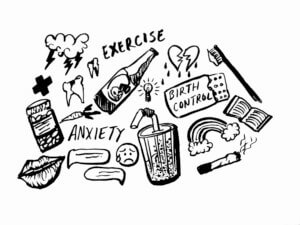Assessment will collect data on student health and well-being, beginning March 19
As a university that prides itself on being student-centered, Mount Allison seeks to adapt and tailor the support and services it offers to best fit student needs. In order to determine these needs and address student concerns, there must be an open dialogue between students and staff. Mt. A will be administering the National College Health Assessment (NCHA) for the first time, beginning the week of March 19, as part of this ongoing dialogue.
The NCHA is a nationally recognized research survey created by the American College Health Association. It is used by educational institutions across the United States and Canada to get a comprehensive picture of their students’ health and well-being by asking questions about students’ habits, behaviours and perceptions.
In the spring of 2016, 41 Canadian post-secondary institutions participated in the assessment. While 43.5 per cent of students described their level of health at the time of the assessment as very good or excellent, questions about the long term gave a better image of general student health. High percentages of respondents reported feeling stressed, overwhelmed, hopeless, lonely and exhausted at least once in the previous year.
Of the students surveyed in 2016, 18.4 per cent received a diagnosis or treatment for anxiety while 14.5 per cent did so for depression. Thirteen per cent of respondents reported having suicidal thoughts at least once during the year and 8.7 per cent self-harmed. The greatest detriments to academic performance were found to be stress, anxiety, depression, sleep problems and the common cold.

In terms of habits, almost half of the participants only consumed one or two daily servings of fruit and vegetables. On a typical night out, the average number of drinks consumed was five, though a quarter of students have seven or more alcoholic drinks. Only half of respondents used any form of contraception the last time they had intercourse. In terms of personal safety, there was a significant gendered difference in responses with female students feeling less safe than male students, especially at night.
The survey requires about thirty minutes to complete and addresses a range of topics including mental, physical and sexual health. Other sections cover areas such as exercise habits, alcohol and drug use, and how health impacts academic performance. Participation in this assessment is voluntary, and you can choose to skip any questions that make you uncomfortable. The data collected will be kept confidential and will not be attached to any identifiers such as name or email.
For this survey to have the largest beneficial impact possible, it is important that all students participate. “We want high participation so that we can use the information to offer the best possible health services at Mt. A,” explained Melissa Baxter, the campus mental health educator.
The data from the assessment will allow the administration to spot trends in students’ health behaviours and identify the most significant health priorities that need to be addressed. Future services, events, programs and initiatives can then focus on these priorities in order to more efficiently and accurately help students with the challenges and issues they face. Potential changes resulting from the survey could include educational initiatives, social media campaigns, campus events or adaptations of Wellness Centre services.
If you have any questions or want more information, you can check out the NCHA website (www.acha-ncha.org) or send an email to Melissa Baxter ([email protected]). This is an opportunity to be heard by the University. Please participate in this assessment so that we, as students, can have an impact on how our university serves us. Help Mt. A students receive the best mental, physical and sexual health care possible.





